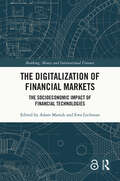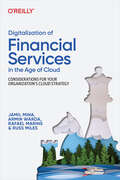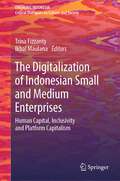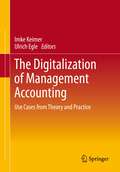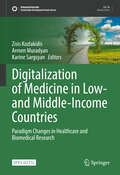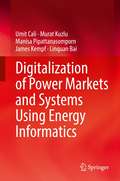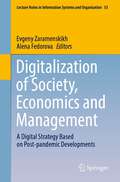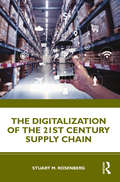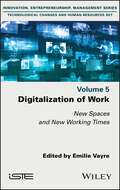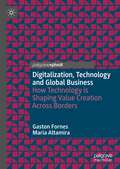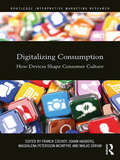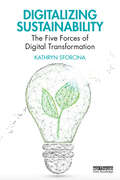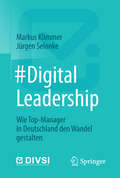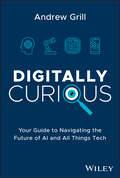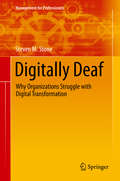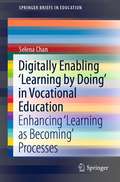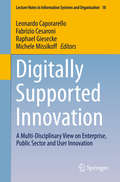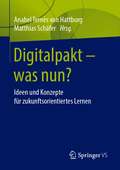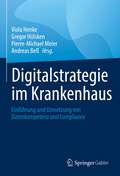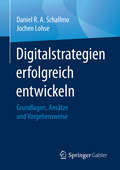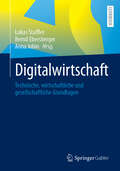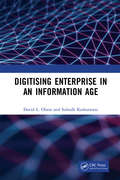- Table View
- List View
The Digitalization of Financial Markets: The Socioeconomic Impact of Financial Technologies (Banking, Money and International Finance)
by Ewa Lechman Adam MarszkThe book provides deep insight into theoretical and empirical evidence on information and communication technologies (ICT) as an important factor affecting financial markets. It is focused on the impact of ICT on stock markets, bond markets, and other categories of financial markets, with the additional focus on the linked FinTech services and financial institutions. Financial markets shaped by the adoption of the new technologies are labeled ‘digital financial markets’. With a wide-ranging perspective at both the local and global levels from countries at varying degrees of economic development, this book addresses an important gap in the extant literature concerning the role of ICT in the financial markets. The consequences of these processes had until now rarely been considered in a broader economic and social context, particularly when the impact of FinTech services on financial markets is taken into account. The book’s theoretical discussions, empirical evidence and compilation of different views and perspectives make it a valuable and complex reference work. The principal audience of the book will be scholars in the fields of finance and economics. The book also targets professionals in the financial industry who are directly or indirectly linked to the new technologies on the financial markets, in particular various types of FinTech services.
Digitalization of Financial Services in the Age of Cloud: Considerations for Your Organization's Cloud Strategy
by Jamil Mina Armin Warda Rafael Marins Russ MilesIf you're planning, building, or implementing a cloud strategy that supports digitalization for your financial services business, this invaluable guide clearly sets out the crucial factors and questions to consider first. With it, you'll learn how to avoid the costly and time-consuming pitfalls and disappointments of cloud adoption and take full advantage of the cloud operational model. You'll discover cloud tactics that unlock the benefits of digitalization and how to create a cloud strategy that has the flexibility to streamline operations, integrate channels, and encourage innovation in your firm.Packed with invaluable advice and real-world case studies, this book will show you how to:Select the right operational models for your needsBuild resilience into your company's technologiesAssess the trade-offs of third-party digital native services versus developing them in-houseEnsure operability across cloud services providersBalance innovation and accountabilityDeal with digitalization issues of particular importance in finance, such as governance, security, and regulatory complianceAnd more
The Digitalization of Indonesian Small and Medium Enterprises: Human Capital, Inclusivity and Platform Capitalism (Engaging Indonesia)
by Trina Fizzanty Ikbal MaulanaThis book examines the digitalization of Small and Medium Enterprises (SMEs) in Indonesia and its challenges in the context of an emerging economy and the Covid-19 crisis. During the Covid-19 pandemic, business digitalization became a must for a business to avoid collapse and people saw that digital transformation is a panacea for SMEs to help them survive and revive from the crises. Governments and other stakeholders in many countries including Indonesia have launched policies and programs to support SMEs. Transforming SMEs' conventional businesses into digitalized versions, however, is a complex issue influenced by various factors. These factors encompass both internal changes within the organization and external dynamics in the ecosystem in which they operate. This book, therefore, is a new approach towards understanding the digitalization of SMEs in Indonesia and includes contributions from scholars with different, multi-disciplinary perspectives and demonstrates that digital transformation of SMEs is not all about technology adoption but also involves other aspects such as social, economic, and public governance factors. It discusses opportunities and challenges of digital transformation of SMEs in Indonesia, such as digital talent, financial inclusion, platform capitalism, automation, government’s role, governance, open competition, and inclusive digital economy. The book is of interest to researchers and students of social economics, SMEs and entrepreneurship, human capital research, and economy and governance.
The Digitalization of Management Accounting: Use Cases from Theory and Practice
by Imke Keimer Ulrich EgleDigital transformation has companies firmly in its grip. Digitalization has a multidimensional impact on the mangagement accounting function and is changing mangagement accounting processes, controlling methods and the role of the mangagement accountant. This edited work shows how the opportunities of digitalization can be used in a way that adds value to the mangagement accounting function. The authors describe individual dimensions of digitalization in mangagement accounting and convey the necessary fundamentals and concepts. Use cases from controlling practice complement the theoretical foundations and show cross-industry approaches to solutions.
Digitalization of Medicine in Low- and Middle-Income Countries: Paradigm Changes in Healthcare and Biomedical Research (Sustainable Development Goals Series)
by Zisis Kozlakidis Armen Muradyan Karine SargsyanThis open access book provides a framework to describe why digitalization of the medical provision services is needed and which level of digitalization is possible in low- and middle-income countries (LMIC). These countries have traditionally been economically and technologically not ready for digitalization, but with recent progress in digitized data acquisition, machine learning and computing infrastructure, healthcare applications are expanding into areas that were previously thought to be the exclusive domain of human experts. It is increasingly accepted that the transformation in healthcare would not be possible if it is not associated with technological innovations in communication, computing, and analytical processing of biological samples.However, this need and development is quite different to what has been experienced in high-income countries, as by definition resource-restricted settings have to navigate through a greater number of competing interests and needs, and as such the context into which digital health needs to be adopted and operate varies greatly. For instance, LMIC healthcare finds itself under a twin pressure of traditional healthcare pressures (such as infectious diseases outbreaks) and a growing elderly population with complex comorbidities, and both these aspects needs to be addressed simultaneously.Digitalization of Medicine in Low- and Middle-Income Countries: Paradigm Changes in Healthcare and Biomedical Research provides in-depth understanding of the root causes for the observed differences in digital healthcare implementation in LMICs. Creating a strong foundation of the current trends and perspectives of digital healthcare in general, readers of this book are able to gain an informative account of how digital healthcare has been adapted to the different LMIC contexts in order to create demonstrable and impactful success stories.
Digitalization of Power Markets and Systems Using Energy Informatics
by Umit Cali Murat Kuzlu Manisa Pipattanasomporn James Kempf Linquan BaiThe objective of this textbook is to introduce students and professionals to fundamental principles and techniques and emerging technologies in energy informatics and the digitalization of power markets and systems. The book covers such areas as smart grids and artificial intelligence (AI) and distributed ledger technology (DLT), with a focus on information and communication technologies (ICT) deployed to modernize the electric energy infrastructure. It also provides an overview of the smart grid and its main components: smart grid applications at transmission, distribution, and customer level, network requirements with communications technologies, and standards and protocols. In addition, the book addresses emerging technologies and trends in next-generation power systems, i.e., energy informatics, such as digital green shift, energy cyber-physical-social systems (E-CPSS), energy IoT, energy blockchain, and advanced optimization. Future aspects of digitalized power markets and systems will be discussed with real-world energy informatics projects. The book is designed to be a core text in upper-undergraduate and graduate courses such as Introduction to Smart Grids, Digitalization of Power Systems, and Advanced Power System Topics in Energy Informatics.
Digitalization of Society, Economics and Management: A Digital Strategy Based on Post-pandemic Developments (Lecture Notes in Information Systems and Organisation #53)
by Evgeny Zaramenskikh Alena FedorovaThis book gathers the best papers presented at the third conference held by the Russian chapter of the Association for Information Systems (AIS), which took place in December 2021. The book shows the path to digital transformation of organizations and how possible obstacles can be overcome. With contributions from digital experts in both academia and IT and management, it presents practical frameworks and planning tools for new business models. It offers executives at the forefront of strategic initiatives a guide on how to implement key disruptive technologies in their organizations while following an established digital strategy. Overall, the book is relevant for scientists, digital technology users, companies and public institutions.
The Digitalization of the 21st Century Supply Chain
by Stuart M. RosenbergThe goal of this book is to gain a clear picture of the current status and future challenges with regard to the digitalization of the supply chain – from the perspective of the suppliers, the manufacturers, and the customers. They were the target groups of the book. Digitization has touched upon all aspects of businesses, including supply chains. Technologies such as RFID, GPS, and sensors have enabled organizations to transform their existing hybrid (combination of paper-based and IT-supported processes) supply chain structures into more f lexible, open, agile, and collaborative digital models. Unlike hybrid supply chain models, which have resulted in rigid organizational structures, unobtainable data, and disjointed relationships with partners, digital supply chains enable business process automation, organizational flexibility, and digital management of corporate assets. In order to reap maximum benefits from digital supply chain models, it is important that companies internalize it as an integral part of the overall business model and organizational structure. Localized disconnected projects and silo-based operations pose a serious threat to competitiveness in an increasingly digital world. The technologies discussed in this text – artificial intelligence, 3D printing, Internet of things, etc. – are beginning to come together to help digitize, automate, integrate, and improve the global supply chains. It’s certainly an exciting and challenging time for both new supply chain professionals and long-time supply chain professionals.
Digitalization of Work: New Spaces and New Working Times
by Émilie VayreDigitalization of Work brings together researchers and international experts whose work and practices are based on a variety of disciplines such as work and organizational psychology, social psychology, ergonomics, communication and information sciences, and management sciences. This book closely examines the challenges associated with recent or emerging ways of working related to the digitalization of work. It acts as a directory of contributions that enrich recent thought and approaches to the deployment and accompaniment of the ways in which work is organized, including practices and environments likely to gain relevance in coming years (remote working and management, coworking for salaried employees, flexible office spaces, working from home and nomadism).
Digitalization, Technology and Global Business: How Technology is Shaping Value Creation Across Borders
by Gaston Fornes Maria AltamiraThis book explores the impact that changes brought by digitalization are having in the way global businesses are run and grown. The main changes in recent years have come from the ubiquitous presence of technology in our daily life (and therefore in business) and also by the direction globalization is taken. Consequently, companies need to review their sources of growth.This book has four primary missions. The first is to critically analyze the impact of digitalization and technology on incumbent international business theories. The second is to deeply understand how digitalization and technology can continue to create growth opportunities. The third is to engage with the opportunities and challenges that digital models and new technologies, digital platforms and Artificial Intelligence in particular, are bringing to the current business and economic environment. And finally, the fourth is to think on possible scenarios and trends that can be the source of growth in the future. This book will be of interest to academics of digital business, international business and innovation and society. It will also be of interest to practitioners and policymakers.
Digitalizing Consumption: How devices shape consumer culture (Routledge Interpretive Marketing Research)
by Franck Cochoy Johan Hagberg Magdalena Petersson McIntyre Niklas SörumContemporary consumer society is increasingly saturated by digital technology, and the devices that deliver this are increasingly transforming consumption patterns. Social media, smartphones, mobile apps and digital retailing merge with traditional consumption spheres, supported by digital devices which further encourage consumers to communicate and influence other consumers to consume. Through a wide range of empirical studies which analyse the impact of digital devices, this volume explores the digitization of consumption and shows how consumer culture and consumption practices are fundamentally intertwined and mediated by digital devices. Exploring the development of new consumer cultures, leading international scholars from sociology, marketing and ethnology examine the effects on practices of consumption and marketing, through topics including big data, digital traces, streaming services, wearables, and social media’s impact on ethical consumption. Digitalizing Consumption makes an important contribution to practice-based approaches to consumption, particularly the use of market devices in consumers’ everyday consumer life, and will be of interest to scholars of marketing, cultural studies, consumer research, organization and management.
Digitalizing Sustainability: The Five Forces of Digital Transformation
by Kathryn SforcinaDigitalizing Sustainability outlines why ‘business as usual’ isn't working and sets out five Transformational Forces which can be used to innovate and scale sustainability solutions using digital means. This transformation will be powered by a range of digital technologies that have the potential to ideate, propel and scale sustainability solutions in an exponential manner over the next decade. This book introduces the Five Forces of Digital Transformation. These forces all share a common root – they are powered by digital technologies that enable them to operate at the speed and scale that we need to achieve global transformation for people and planet. Working together, these forces help overcome many of the barriers and pitfalls that humanity has faced in trying to achieve sustainability 2.0 and will help you tackle these questions: Why has sustainability 1.0 failed us? What are the bugs and bad code in our operating systems that we must address to have any hope of creating a sustainable civilization? What are the Five Forces of Digital Transformation that will forge a sustainable and resilient future for our people and planet? What are the core priorities going forward for coalitions of the willing to harness these forces for sustainability and resilience? Disruptive and innovative, this book provides readers with a clear path forward to a sustainable digital future. It will be of great interest to anyone interested in the adoption of digital technologies for driving solutions to global sustainability challenges.
#DigitalLeadership: Wie Top-Manager in Deutschland den Wandel gestalten
by Markus Klimmer Jürgen SelonkeDieses Buch liefert einen einzigartigen Einblick in den Umgang von CEOs und Top-Managern mit der Digitalisierung der Arbeitswelt. Es zeigt, basierend auf Interviews, wie die h#65533;chsten F#65533;hrungsebenen in Unternehmen, #65533;ffentlichem Sektor und Gewerkschaften diese massiven Ver#65533;nderungen erleben. Die Autoren gehen vor allem auf die Methoden und Konzepte ein, mit denen sich Top-Entscheider der n#65533;chsten Stufe der digitalen Revolution stellen. Die Besonderheit dieses Buchs liegt aber in den pers#65533;nlichen Einblicken der CEOs zum individuellen Umgang mit dem schnell voranschreitenden Wandel durch Digitalisierung. DigitalLeadership ist ein Projekt des Deutschen Instituts f#65533;r Vertrauen und Sicherheit im Internet (DIVSI) und setzt sich zum Ziel, die Bewertungssicherheit bei stark technologie- und IT-bestimmten Fragestellungen zu erh#65533;hen. Eine lohnenswerte Lekt#65533;re, nicht nur f#65533;r F#65533;hrungskr#65533;fte aus Unternehmen, #65533;ffentlichem Sektor und Gewerkschaften.
Digitally Curious: Your Guide to Navigating the Future of AI and All Things Tech
by Andrew GrillA straightforward and accessible explainer of new and upcoming technologies for business leaders In Digitally Curious: Your guide to navigating the future of AI and all things tech, futurist, speaker, and technology trends expert Andrew Grill delivers an easy-to-follow and incisive discussion of current and future technologies, as well as how leading companies are deploying them. The author examines critical business concepts, like the future of work, from a technical and human-centric point of view and how Artificial Intelligence will impact us at work and in society. He includes a broad range of relevant technologies and platforms, offering examples that will be immediately relevant to any industry and business. Digitally Curious offers recent and relevant examples via accessible and revealing interviews with global business leaders from various fields. The book also provides: Actionable insights and end-of-chapter takeaways, with links to further information and additional resources Complimentary access to a companion website created and updated by the author, a 30-year veteran of technology and business Immediately applicable steps you can implement right away to create positive change in your business Digitally Curious is perfect for managers, executives, board members, and other business leaders. It is the ideal resource for anyone looking for a simple and straightforward explanation of how new and upcoming tech and digital trends will impact you at work and in broader society.
Digitally Deaf: Why Organizations Struggle with Digital Transformation (Management for Professionals)
by Steven M. StoneCompanies across all industries are leveraging digital technologies to transform outdated processes and build new business models to compete in the information age. For all the publicity and hype, successful digital transformation has proven to be elusive. Numerous studies have found more than half of all digital transformation efforts fail. Digitally Deaf explores the obstacles and inhibitors that derail transformation efforts and outlines the steps organizations should take to establish an environment for success. Written by a highly experienced CIO, Digitally Deaf illustrates symptoms and underlying issues through the author’s experiences at large, Fortune 250 organizations. Digitally Deaf establishes a framework for digital transformation execution beginning with the development of a common definition and language for transformation. Learn the roles of the board of directors and leadership in establishing the appropriate messaging, governance, and organizational structure to drive digital efforts. Realize how digital transformation efforts amplify common problems encountered in typical technology projects. Discover how the IT organization must transform to enable the agility needed to fuel new digital business models. Finally, learn to spot the symptoms of issues that undermine transformation success and how to address them.“On the topic of digital transformation, Steve addresses the mind set shift that is needed to be successful, leveraging relatable examples across multiple industries. Digitally Deaf offers a very relevant perspective on what it takes to move a traditional organization into the digital age.” Boris Sherman, CTO Tailored Brands “Stone, as a former CIO, accurately outlines the challenges associated with new technologies and the benefits of implementing a digital-first culture. This book helps business and technology leaders understand the landscape and how to embrace digital to create new sources of value in their organizations.” Jonathan Brassington, Head, Capgemini Invent North America
Digitally Enabling 'Learning by Doing' in Vocational Education: Enhancing ‘Learning as Becoming’ Processes (SpringerBriefs in Education)
by Selena ChanThis book introduces, rationalizes and describes some ways to circumvent the challenges of providing ‘hands-on’ learning when programmes with practice-based focuses have to be offered via distance learning. It presents a framework to help deconstruct the many aspects of ‘learning to become’ a professional or practitioner. Then, it demarcates the skills, knowledge and attributes towards ensuring learners are prepared for the exigencies of the future of work. The book details the types of pedagogical approaches, including project/inquiry/problem-based learning, which help assist learners to learn both the competencies and capabilities required. It introduces technology-enhanced learning (TEL) platforms and tools supporting ‘education 4.0’, and presents a series of contemporary research studies on the integration of TEL, which are augmented and updated to allow for the challenges of provisioning opportunities for ‘learning by doing’ through distance learning. Finally, the book proposes recommendations to help ensure that institutions are better prepared for the sustainable shift to distance learning.
Digitally Supported Innovation
by Leonardo Caporarello Fabrizio Cesaroni Raphael Giesecke Michele MissikoffThis book provides a broad overview of Information and Communication Technology (ICT)-supported innovation both on an evidence-based level, a theoretical and a methodological level. It presents multi-disciplinary perspectives on organizational innovation in enterprises and the public sector, and on the ubiquitous social media-based user innovations. The book especially highlights innovation in knowledge work and human-computer interaction, innovation of and in socio-technical systems, and user-based innovation in public services. It draws upon evidence from various areas of application, including innovative mobility and the factories of the future. The studies presented here will be helpful both for innovation scholars and practitioners in industry - as well as innovators at large - in their current and future studies and undertakings.
Digitalpakt – was nun?: Ideen und Konzepte für zukunftsorientiertes Lernen
by Matthias Schäfer Anabel Ternès von HattburgDas Buch zeigt aus einer psychologisch-pädagogischen Perspektive auf, wie sich Lernen in Bildungseinrichtungen in Deutschland in den letzten Jahren verändert hat, welche neuen Angebote bereits entwickelt wurden und welcher Bedarf weiterhin noch besteht. Hierzu wurden Expertinnen und Experten um ihre Einschätzungen gebeten. Ihre Ideen und Konzepte zu Veränderungen, Entstehungskontexten und Auswirkungen aktueller Bildungsrichtungen werden dokumentiert. Zudem werden Organisationen und Initiativen in Deutschland vorgestellt, die Formen veränderten Lernens offline und online anbieten. Insofern ist das Buch auch ein Beitrag zur politischen Debatte.
Digitalstrategie im Krankenhaus: Einführung und Umsetzung von Datenkompetenz und Compliance
by Viola Henke Gregor Hülsken Pierre-Michael Meier Andreas BeßDer Aufbau von Datenkompetenz und die Compliance-konforme Gestaltung, Einführung und Umsetzung einer Digitalstrategie stellen Krankenhäuser oftmals vor große Herausforderungen. Dieses Buch unterstützt die an der Erfüllung dieser anspruchsvollen Aufgabe beteiligten Akteure. So präsentiert es die wesentlichen Gestaltungselemente von Digitalstrategien ebenso wie Methoden und Tools zu deren Umsetzung. Ferner beschreibt das Werk die Messung des Umsetzungserfolges auf Basis von Reifegradmodellen und bietet Empfehlungen zur Gewährleistung von Compliance und Datenkompetenz anhand der digitalstrategischen Handlungsfelder. Ein weiterer Schwerpunkt beschäftigt sich mit konsolidierten, digitalen Patientenakten, den Herausforderungen bei der Nutzbarmachung darin enthaltener Informationen und ihren möglichen Potenzialen zur Wissensgenerierung. Konkrete Umsetzungsbeispiele und Best Practices aus unterschiedlich strukturierten Krankenhäusern ermöglichen einen praxisorientierten Wissenstransfer.Der InhaltDie Digitale Transformation der GesundheitswirtschaftStrategieentwicklung im Krankenhausumfeld: Besonderheiten und UmsetzungsrahmenInformationssicherheitKommunikationsfähigkeit und ProzesseffizienzWissensgenerierungKriterien und Ansätze zur praxisorientierten Entwicklung von Compliance und DatenkompetenzDr. Viola Henke ist in leitender Position in einem Unternehmen der Gesundheits-IT tätig. Sie verfügt über langjährige Erfahrungen u.a. in den Bereichen Krankenhausmanagement, Prozessmanagement und elektronische Archivierung. Prof. Dr. Gregor Hülsken ist Humanmediziner, Hochschuldozent für Wirtschafts- und Medizininformatik an der FOM Hochschule für Oekonomie & Management in Essen und Senior-Berater in einem IT-Beratungsunternehmen. Dr. Pierre-Michael Meier,CHCIO ist Gründer und Protagonist des Eco Systems ENTSCHEIDERFABRIK, das seit 2006 mit den Krankenhausentscheidern die Chancen der digitalen Transformation umsetzt. Dr. Andreas Beß ist Vorstand eines IT-Beratungsunternehmens und berät seit vielen Jahren Einrichtungen des Gesundheitswesens zur strategischen Ausprägung der Digitalisierung und Informationsverarbeitung.
Digitalstrategien erfolgreich entwickeln: Grundlagen, Ansätze und Vorgehensweise
by Daniel R. Schallmo Jochen LohseDie Digitalisierung hat in den letzten Jahren sowohl in der Praxis als auch in der Wissenschaft an Relevanz gewonnen. In diesem Zusammenhang ist auch das Thema der Digitalstrategie in den Vordergrund gerückt. Sie ist die ganzheitliche Ausrichtung von Digitalisierungsvorhaben in Unternehmen und Organisationen, um den digitalen Wandel zu antizipieren und mitzugestalten.Neben wesentlichen Grundlagen zur Digitalstrategie betrachten die Autoren Fallstudien aus der Unternehmenspraxis und liefern zudem Erkenntnisse aus der Wissenschaft. Sie bieten eine Auswahl an bestehenden Ansätzen, erarbeiten einen eigenen integrativen Ansatz zur Entwicklung einer Digitalstrategie mit sechs Phasen und zeigen vier generische Optionen auf.Die vorliegende Abhandlung bietet Praktikern aus den Bereichen Geschäftsleitung, Strategieplanung, Business-Development, Marketing und Vertrieb eine kompakte und praxiserprobte Hilfestellung für die erfolgreiche Entwicklung einer Digitalstrategie.Wissenschaftlern, Lehrenden und Studierenden aus den Bereichen Innovationsmanagement, strategisches Management und Entrepreneurship bietet die Abhandlung einen Einblick in das Thema.
DigitalThink: Building a Sales Force
by Joseph B. Lassiter Christina Darwall Michael J. RobertsA broad set of issues faces a young company in the Internet-based training business as it begins to sell its product to corporate customers. Issues include: profile of attractive candidates, compensation, definition of territory, definition of quotas, and role of regional management.
DigitalThink: Startup
by William A. Sahlman Christina Darwall Michael J. RobertsDescribes a recent Berkeley MBA's attempts to start a business aimed at corporate training via the Internet. Describes the very early efforts at finding an attorney, accountant, and financing, and the interrelationships among these choices.
Digitalwirtschaft: Technische, wirtschaftliche und gesellschaftliche Grundlagen
by Lukas Staffler Bernd Ebersberger Anna JobinDieser Sammelband bietet technisches, wirtschaftliches und gesellschaftliches Grundwissen über die Digitalwirtschaft mit dem Ziel, ihre Möglichkeiten zu nutzen und aktuelle Diskurse mitzugestalten. Fachkundige aus unterschiedlichen Branchen haben sich der Aufgabe gestellt, einen verständlichen und leicht lesbaren Überblick über die Grundlagen der Digitalwirtschaft zu geben. Die umfassende Darstellung startet mit technischen Grundlagen, geht dann auf die ökonomischen, geschäftlichen, sozialen, ethischen und sicherheitsrelevanten Aspekte der digitalen Wirtschaft ein und widmet sich schließlich ihren unterschiedlichen Anwendungsfeldern in der Praxis, wie AdTech, FinTech, LegalTech, MedTech u.v.m. Der Band muss nicht linear durchgearbeitet werden; vielmehr können Lesende das Buch wie einen Reader nutzen und einzelne Beiträge interessengesteuert lesen.
Digitisation and Low-Carbon Energy Transitions
by Siddharth Sareen Katja MüllerThe world is digitising as the need for low-carbon transitions gains urgency. Decarbonising energy requires the digital process control of energy production, transmission and end use. Diversified electrification across sectors requires real-time digital coordination of distributed energy production, At the same time, digitisation is accompanied by significant increases in energy demand, partly compensated through energy efficiency gains.The emergent linkages between digitisation and decarbonisation – that constitute and enable the twin transition – are the subject of this book. The collection features authors from across the social sciences who situate digitisation and low-carbon energy transitions in the socio-technical and political economic contexts in which they unfold, to offer insights on the dynamics and contingencies of digitisation in and beyond the energy sector.This is an open access book.
Digitising Enterprise in an Information Age
by David L. Olson Subodh KesharwaniDigitising Enterprise in an Information Age is an effort that focuses on a very vast cluster of Enterprises and their digitising technology involvement and take us through the road map of the implementation process in them, some of them being ICT, Banking, Stock Markets, Textile Industry & ICT, Social Media, Software Quality Assurance, Information Systems Security and Risk Management, Employee Resource Planning etc. It delves on increased instances of cyber spamming and the threat that poses to e-Commerce and Banking and tools that help and Enterprise toward of such threats. To quote Confucius, “As the water shapes itself to the vessel that contains it, so does a wise man adapts himself to circumstances.” And the journey of evolution and progression will continue and institutions and enterprises will continue to become smarter and more and more technology savvy. Enterprises and businesses across all genre and spectrum are trying their level best to adopt to change and move on with the changing requirements of technology and as enterprises and companies upgrade and speed up their digital transformations and move their outdate heirloom systems to the cloud, archaic partners that don't keep up will be left behind. Note: T&F does not sell or distribute the Hardback in India, Pakistan, Nepal, Bhutan, Bangladesh and Sri Lanka.
